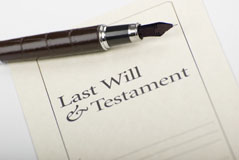Witnessing and Execution of Wills - How to avoid disappointing the beneficiaries
beneficiaries
In the second of a series of articles which look at best practice tips we will consider how simple administrative errors in the witnessing and execution of Wills can give rise to negligence claims against legal practices.
Witnessing a Will
Correctly witnessing a Will is very important. Firstly for a Will to be valid a clients signature must be witnessed by two people over the age of 18 who must be present at the time the client signs it. Secondly a witness must not benefit from a Will. If anything has been left to a witness they will lose their entitlement to whatever they have been left. Generally speaking these requirements help to ensure that a client is mentally competent and not under duress at the time when they sign (execute) their Will.
The high profile case of the Estate of Richard Sherrington, deceased (2004), involved a dispute about the estate of a successful solicitor who was killed in a car accident having signed a Will that left everything to his second wife. She was also appointed as the sole executor. It transpired that the deceased’s relationship with his second wife was not a happy one and there was evidence that he believed she had only married him for his money. With this in mind there were serious questions about the circumstances surrounding the making of the Will. One of the key questions involved how the Will had been witnessed.
The wife of the deceased’s chauffeur and the office cleaner had witnessed the Will. When giving evidence both witnesses confirmed that they had not seen the deceased sign the Will. In addition, one of the witnesses could not speak or read English. The judge found that the Will was invalid for lack of due execution and, therefore, revoked the Grant of Probate. Without proper witnessing of the deceased’s signature his second wife could not prove that he knew or approved of the contents of the Will when he signed it.
Execution of a Will
In principle a solicitor can owe a duty to both a testator and the beneficiaries of a Will to check and ensure that the proper formalities for execution have been complied with.
In the case of Humblestone v Martin Tolhurst Partnership [2004] EWCH 151 the testator had dated but not signed his Will at home. The testators wife asked for the Will to be checked and unfortunately the secretary who looked it over did not notice the missing signature.
It was obvious that the Will had not been correctly executed therefore the firm was liable to pay damages to any beneficiary that was deprived of benefiting from the deceased’s estate. It did not matter that the firm was not instructed to assist with the execution of the Will; they must still check that on the face of it the Will has been properly executed.
The Last Word
Each firm should have its own procedure for ensuring that Wills are correctly witnessed and executed. Being aware of the importance of following these procedures or identifying any weaknesses in the system will help your firm from making a simple but costly mistake and ultimately ensure that clients’ beneficiaries are not disappointed.

